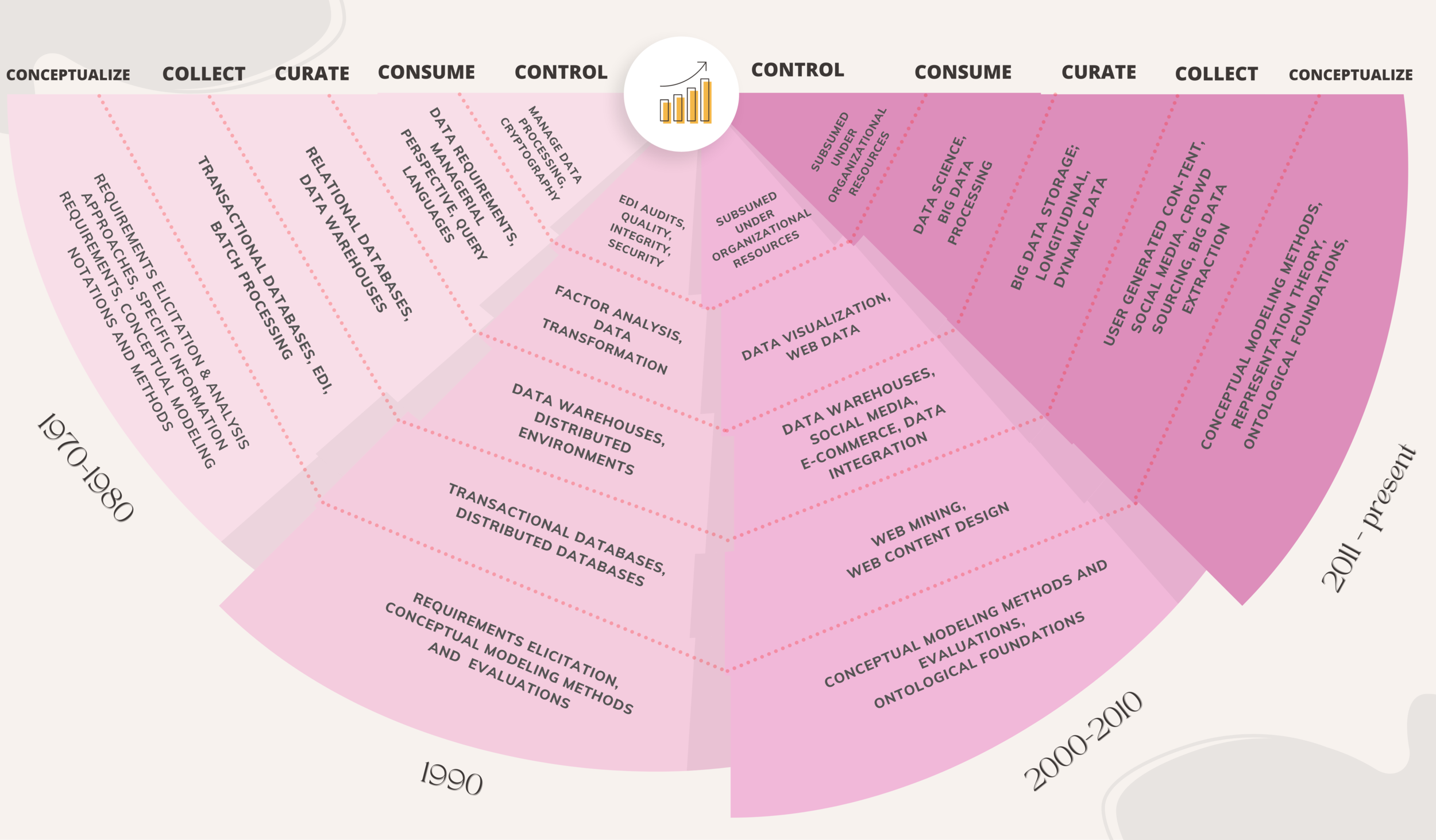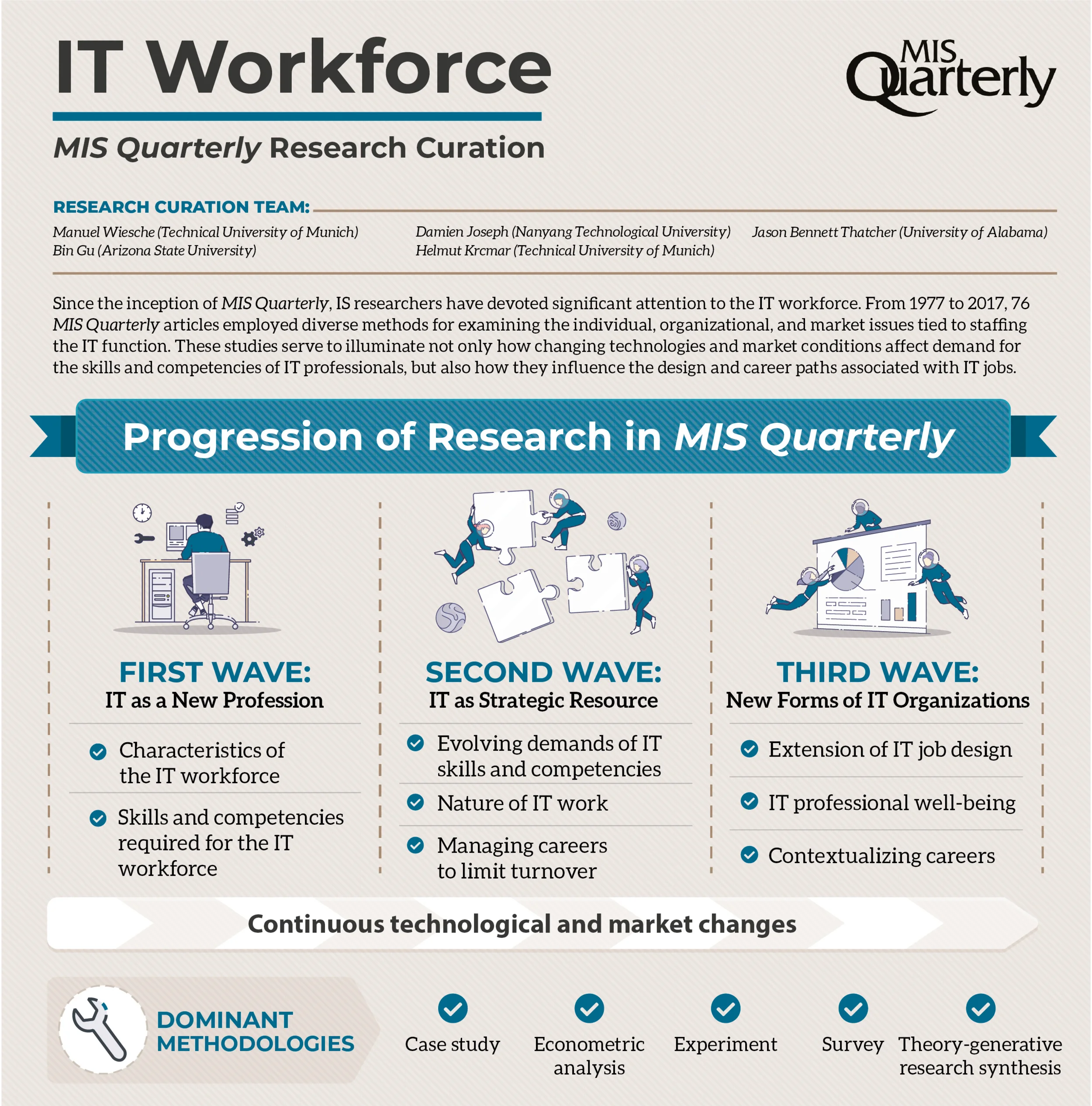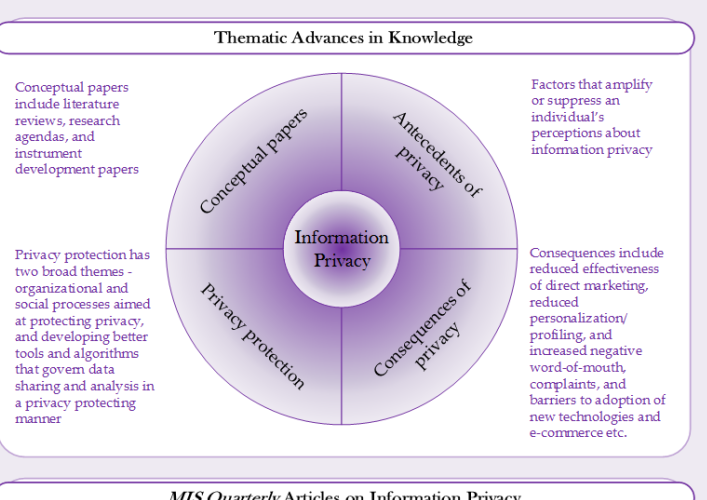About MIS Quarterly Research Curations
The purpose of MIS Quarterly Research Curations is to identify topics of significant interest to the IS field and other disciplines, identify MISQ articles that make significant contributions to these topics, and provide researchers with easy access to a bundle of MISQ articles on which to further build or extend research. Each curation will include a short summary of the topic and the bundle of MISQ articles related to the topic. It will be accessible from the MISQ web site and will serve as a living document that is updated as new articles related to the topic are published. The MISQ Research Curations initiative will be managed by a Research Curations Editor in close collaboration with the Editor-in-Chief. The Research Curations Editor and the EIC will invite a team of researchers who collectively represent different perspectives related to a topic to develop a curation. The curation will undergo an iterative development process before it is released. The curations initiative is described in the following editorial - MISQ Research Curations: Bundling for Impact.
Research Curations Editor: Professor Hind Benbya (Deakin University) [email: h.benbya @ deakin (dot) edu (dot) au]
The success of platforms such as Amazon, Alibaba, Google, Uber, Netflix and Facebook has generated great interest. There is now a large body of research in MIS Quarterly on platforms (and the closely associated concept of ecosystems). This curation brings readers up to date on the nature of research on platforms and ecosystems in MIS Quarterly, the major topics covered, and thematic advances over time.
The ubiquity of information and communication technologies (ICTs) has generated growing enthusiasm for its prospects to contribute to human development. At the same time, this pervasiveness also carries the potential for unfavorable outcomes. The implications of ICTs on society constitute a complex and multidimensional phenomenon with ambiguous boundaries and often unintended consequences. In this curated collection on the societal implications of ICTs, we include studies focused on scrutinizing the consequences of digital technology on enabling or constraining different aspects of people’s lives, such as access to health and education services, economic opportunities, political participation, civic engagement, gender equality, and environmental sustainability.
In our modern, digital world, the critical role of information technology makes data management an important research topic. This paper curates data management research at MIS Quarterly as it has progressed from its early context of understanding requirements of relatively simple information systems to the sophisticated and complex systems of today. We discuss different themes of data management, and the progression of research on data management over time.
Since the inception of the MIS Quarterlyin the 1970s, collaboration has been an important topic for IS researchers. The GSS and GDSS labs in the University of Arizona and University of Minnesota gave rise to a wave of studies examining how IT-mediated collaboration can substitute for, and in some contexts, even surpass traditional face-to-face collaboration.
Online word-of-mouth (WOM) has been an important area of scholarly inquiry at the intersection between Internet technologies and marketing (where the concept of offline WOM was born). Though there is no consensus around what it refers to, we define online (or electronic) WOM as any statements publicly available on the Internet that are made by individuals about any object of their interest (e.g., a product, a seller, stock market, a political figure or event).
Since the inception of MISQ in 1977, information systems (IS) control and governance have been, and continue to be, vibrant research streams of key interest to the IS discipline. While both IS control and governance are concerned with ensuring the alignment of IS-related activities and information technology (IT) artifacts and resources (including human resources) with an organization’s objectives and strategy, the two are often viewed as operating at different levels; with IS governance focusing on alignment mechanisms at the meso level and IS control focusing on managerial alignment mechanisms at the micro level.
IT project management has long been a key area of interest among IS scholars and practitioners, since IT projects constitute a key vehicle for IS development and implementation. A project can be defined as an interrelated set of activities intended to accomplish certain desired objectives within a limited period of time, typically executed by a project team. IT projects involve developing and/or deploying IT artifacts (comprised of either software, hardware, or both). IT project management thus refers to the application of knowledge, skills, techniques, and processes to conduct such projects within agreed-upon parameters (e.g., budget, schedule, scope, quality), and in concert with organizational goals and priorities.
IS researchers have devoted significant attention to the IT workforce since the inception of MIS Quaterly (Jenkins and Johnson 1977). From 1977 to 2017, MIS Quarterly has published 76 articles that have employed diverse methods for examining the individual, organizational, and market issues tied to staffing the IT function in an organization. These studies illuminate not only how changing technologies and market conditions affect demand for the skills and competencies of IT professionals, but also how …
The alignment of Information Systems (IS) with the business (i.e., hereafter IS alignment) has been a top managerial concern for over 30 years and remains an ongoing research stream of key interest to the IS discipline. IS alignment[1] represents an emergent process of dynamic interactions and continual adjustments between business and IS across multiple organizational dimensions (e.g., strategic, operational and social) and also organizational levels (e.g., the organization itself, group level, and the individual level) that collectively can potentially result in greater organizational performance
Information Systems (IS) Sourcing is a broad umbrella term that refers to the contracting or delegating of IS- or IT-related work (e.g., an ongoing service or one-off project) to an internal or external entity (a supplier). It encompasses various sourcing models that are typically based on the distinction between ownership (in-house or third party) and location (domestic, nearshore or offshore), as well as online sourcing models. The significance of this topic for the IS discipline is evident in the number of publications that have addressed different aspects of IS sourcing since 1998 when the first two MISQ articles on this topic were published.
Health information technology (health IT) research is conducted at an intriguing intersection between societies, organizations, and consumers. Health IT is defined as “a broad concept that encompasses an array of technologies to store, share, and analyze health information.” The rapid increase in adoption and use of health IT since the mid-2000s has afforded considerable research opportunities to evaluate and test existing theories (e.g., Paul and McDaniel Jr 2004) as well as to create and refine new ones (e.g., Gao et al. 2015).
The notions of knowledge and its management have been at the core of the information systems (IS) field almost since its inception. Knowledge has been viewed in several ways in the prior literature, including as a state of mind, an object, a process, access to information, and a capability. A commonly-used definition characterizes knowledge as a justified belief that increases an entity's capacity for effective action (Alavi and Leidner 2001, p. 109). Relatedly, knowledge management (KM) has been defined as a systemic process to acquire, organize, and communicate individual knowledge so that others may make use of it (Beck et al. 2014). Knowledge-management systems (KMSs) support these processes for creating, exchanging, and storing knowledge (Beck et al. 2014), and have been viewed as being either repository-based or network-based (Kankanhalli et al. 2005).
Information systems (IS) use is among the most central constructs in the IS discipline (Straub and del Guidice 2012). It is reported to be the most widely-studied construct in our field (Cordoba et al. 2012), and it is certainly one of the most consequential, for the nature, modalities and extents of information systems use significantly impact outcomes at individual, group, organization, network, society, and country levels.
This curation highlights the 22 articles with a primary focus on information privacy that have been published in MIS Quarterly (see Table 1). Almost all of the definitions of information privacy in these articles have relied on the concept of a data subject’s control of information about himself or herself, and we embrace such a definition here: “the ability of the individual to personally control information about one’s self” (Awad and Krishnan 2006; Smith et al 1996). Note that Bélanger and Crossler (2011) offered definitions of information privacy concerns (distinct from, but obviously related to, definitions of information privacy itself) at the group, organizational, and societal levels.
















Information systems development (ISD) has been a fundamental topic in MISQ from its first volume (Juergens 1977, Kling 1977). We developed the following definition of ISD to focus this curation - ISD is the entire suite of development activities (e.g., planning, analysis, design, building, testing, and maintenance) undertaken by agents (humans [individuals/ collectives] or software) to create a working information system. ISD is embedded in a social, organizational, and technical context with stakeholders who influence and are influenced by the ISD activities.